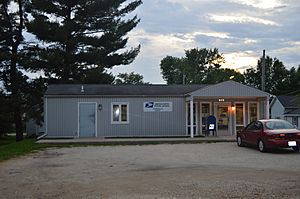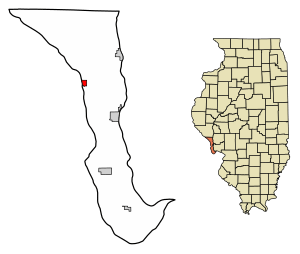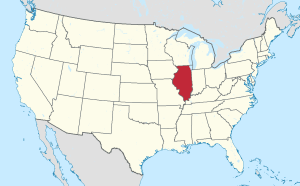Hamburg, Illinois facts for kids
Quick facts for kids
Hamburg
|
|
|---|---|

Hamburg post office
|
|

Location of Hamburg in Calhoun County, Illinois.
|
|

Location of Illinois in the United States
|
|
| Country | United States |
| State | Illinois |
| County | Calhoun |
| Area | |
| • Total | 0.656 sq mi (1.70 km2) |
| • Land | 0.522 sq mi (1.35 km2) |
| • Water | 0.134 sq mi (0.35 km2) |
| Elevation | 554 ft (169 m) |
| Population
(2020)
|
|
| • Total | 99 |
| • Density | 150.9/sq mi (58.3/km2) |
| Time zone | UTC-6 (CST) |
| • Summer (DST) | UTC-5 (CDT) |
| ZIP Code(s) |
62045
|
| Area code(s) | 618 |
| FIPS code | 17-32395 |
| GNIS feature ID | 2398227 |
| Wikimedia Commons | Hamburg, Illinois |
Hamburg is a small village in Calhoun County, Illinois, United States. In 2020, about 99 people lived there. This was a decrease from 128 people in 2010.
Contents
Where is Hamburg Located?
Hamburg is found at 39°13′53″N 90°42′58″W / 39.23139°N 90.71611°W. It covers an area of about 0.66 square miles (1.71 square kilometers). Most of this area is land, with a small part being water.
A Look at Hamburg's History
Hamburg was first offered for sale in 1836 by John Shaw. It used to be a busy community along the Mississippi River. People would load and ship apples from here. Banks were active, and stores were full of shoppers.
Today, Hamburg is much quieter. It sits right next to the Mississippi River, and sometimes the river's waters even reach into the village. The only public building left is the Hamburg Post Office.
There is a special monument on a bluff overlooking the village. It marks the burial place of a riverboat captain named Swarnes. He wanted to be buried standing up. This way, he could always look out over the river he loved. In 1975, a picture of the famous riverboat Delta Queen passing Hamburg was published in National Geographic. The photo was taken from Captain Swarnes' monument.
Who Lives in Hamburg?
| Historical population | |||
|---|---|---|---|
| Census | Pop. | %± | |
| 1880 | 95 | — | |
| 1900 | 308 | — | |
| 1910 | 335 | 8.8% | |
| 1920 | 352 | 5.1% | |
| 1930 | 288 | −18.2% | |
| 1940 | 300 | 4.2% | |
| 1950 | 225 | −25.0% | |
| 1960 | 264 | 17.3% | |
| 1970 | 162 | −38.6% | |
| 1980 | 166 | 2.5% | |
| 1990 | 150 | −9.6% | |
| 2000 | 126 | −16.0% | |
| 2010 | 128 | 1.6% | |
| 2020 | 99 | −22.7% | |
| U.S. Decennial Census | |||
In 2020, there were 99 people living in Hamburg. These people made up 42 households and 35 families. The village had about 151 people per square mile.
Most residents (about 80%) were White. A small number were African American or Asian. Some people identified with two or more races. About 5% of the population was Hispanic or Latino.
Many households (about 36%) had children under 18 living with them. Most families (about 71%) were married couples. The average household had about 4 people.
The median age in Hamburg was 57.2 years old. This means half the people were younger than 57.2, and half were older. About 25.5% of the population was under 18. About 26.8% were 65 or older.
The median income for a household was $38,571 per year. This means half the households earned more, and half earned less. About 8.6% of families and 15% of all residents lived below the poverty line. This included almost half of the children under 18.
Schools in Hamburg
Students in Hamburg attend schools in the Calhoun Community Unit School District 40.
See also
 In Spanish: Hamburg (Illinois) para niños
In Spanish: Hamburg (Illinois) para niños
 | Toni Morrison |
 | Barack Obama |
 | Martin Luther King Jr. |
 | Ralph Bunche |

